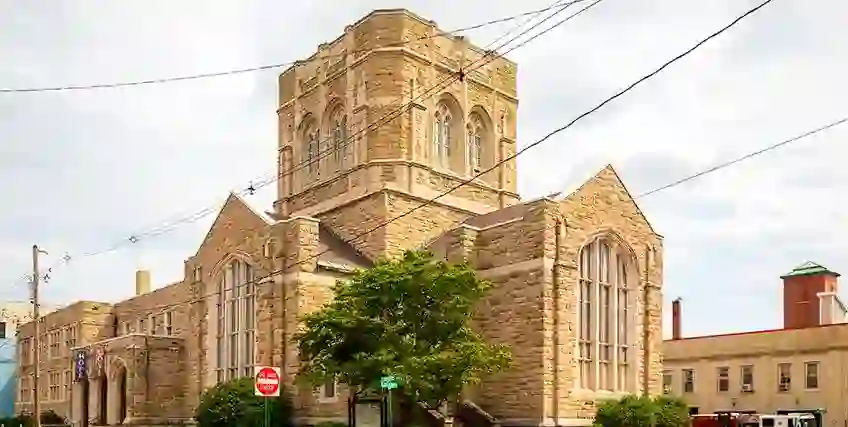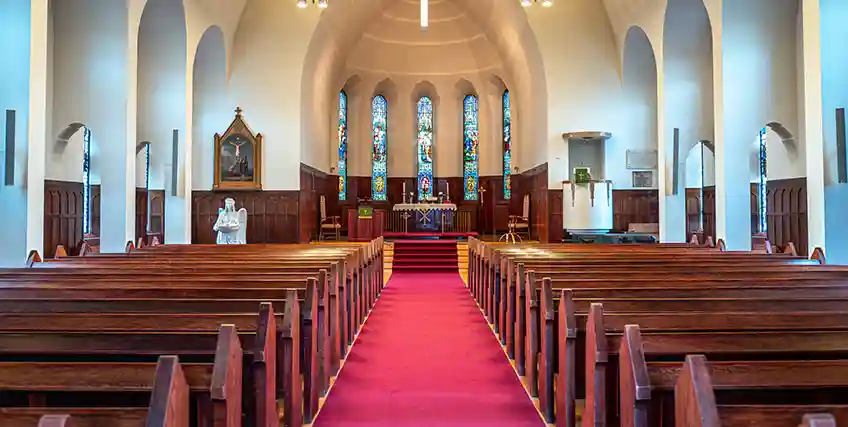How Faith-Based Organizations Can Qualify for Business Loans
November 21, 2025 | Last Updated on: November 21, 2025

Although they’re not taxed like businesses, faith-based organizations can get business loans. Faith-based loans, or church loans, are any financing taken out by faith-based organizations to help with church refinancing, expansion, maintenance, renovation, and more.
Faith-based organizations and churches are typically nonprofits but can still tap into commercial church loans to cover costs. That’s because although churches do derive income from tithes or constituent offerings, the cost of maintaining a property may be significant. Faith-based loans provide additional financial flexibility without the proprietors needing to apply for personal loans or other financial services.
In this article:
- How faith-based loans work and how churches and other organizations can use these loan proceeds.
- The types of business loans for churches and how to determine the right choice.
- How to apply for a faith-based loan, including the regulatory requirements you must keep in mind.
Are There Business Loans for Churches?
Churches and faith-based organizations can take out small business loans from private lenders, including those backed by the U.S. Small Business Administration (SBA). As nonprofits, church borrowers may find more competitive rates and better loan terms from products designed for nonprofits, but they can still leverage business loans to meet their unique needs.
That said, financial institutions typically view churches as high-risk organizations, which may make getting a faith-based loan difficult. Churches and organizations might consider faith-based financial institutions that specifically loan to churches and other faith-based organizations, or alternative lenders that have less strict eligibility requirements.
Like any business loan, your faith-based organization will have a better chance of qualifying for a loan if the signers of the loan (often board members or a pastor) have a strong personal credit score and the church has detailed financial records demonstrating an ability to repay the loan. It can also help to have a detailed plan for how you plan to use the money so the financial institution understands there will be clear, responsible management.
How Can Churches Use Faith-Based Loans?
Faith-based loans are typically treated like business loans, meaning they can usually be used for any church purpose. (They’re not for personal use, so a minister couldn’t use a faith-based loan to pay off their student loan, auto loan, or get a home equity loan through the church for their personal home improvement.)
Some types of loans may have restrictions, but broadly speaking, you may be able to use commercial church loans for:
- New church construction
- Expanding an existing church building
- Renovating an existing church building
- Debt consolidation or refinancing of an existing mortgage loan
- Refinance other types of debt
- Day-to-day expenses
- Expanding church programs, like a school or camp
- Expanding outreach
- Improving the accessibility of existing church structures
Ultimately, you can use most faith-based loans for any church purpose, just like a business loan. There are exceptions, however, depending on the type of loan. For instance, a mortgage loan that is secured by the property it was used to buy can only be used for that property.
Types of Faith-Based Loans
Faith-based organizations have access to most of the same types of business loans as any business. Plus, they may access nonprofit loan programs through the SBA, traditional banks, federal credit unions, and alternative lenders.
Some types of business loans for churches include:
- Term loans: Faith-based loans can be conventional business loans, that offer a lump sum upfront payment into your online banking or savings account in exchange for monthly payments determined by an annual percentage rate and repayment term. You can use these loan proceeds for any church-related needs.
- SBA loans: Partially backed by the federal government, SBA loans offer competitive loan rates for a number of loan programs. Many churches took advantage of SBA forgiveness loans during the COVID-19 pandemic, and today the SBA offers Microloans and grants to qualified nonprofits.
- Commercial real estate loans: Essentially business mortgage loans, commercial real estate loans are secured loans that allow you to purchase property to build a new church, expand your existing one, or do a full-scale renovation. These faith-based loans can help your church expand its membership while paying a fixed rate over time.
- Business lines of credit: With a business line of credit, you’re approved for a maximum loan amount, but you only pay interest on the amount you use. So, if you have a $50,000 limit but you withdraw $10,000 for a project, you only pay an origination fee and interest on the $10,000. Lines of credit are often revolving, meaning that after you repay what you’ve borrowed, you’ll have access to the full line of credit again, giving you ongoing financial flexibility.
- Business credit cards: Faith-based loans may have a complicated application process and strict regulations. However, churches and other faith-based organizations can still use credit cards to make purchases and earn rewards. These can be a low-maintenance way to make purchases on behalf of the church.
These types of loans are generally available from traditional financial institutions, like banks and credit unions, as well as alternative lenders. Lenders that have experience working directly with faith-based organizations like churches may have more specific loan options that can be tailored to your organization’s specific needs. It’s always a good idea to spend some time shopping for lenders and comparing the various loan products on the market.
How to Get a Faith-Based Loan
While the application process is mostly similar to getting a business loan, there is one major caveat when applying for a faith-based loan. The regulatory requirements are different for faith-based organizations than businesses, so you’ll have to meet a stricter set of criteria to be considered. While they may vary slightly between lenders, the basic requirements when applying for a faith-based loan generally include:
- Three years of financial statements
- A history of the church, including the denomination, background, and location(s)
- Biographies and information on the church leaders
- A resolution that allows church leaders to apply for funding
- The constitution and bylaws of the church
- The total of the church’s giving units
- Statement of purpose for the funds
Each lender may have different specific financial requirements or documentation they want to see, but you should at least have these items prepared when you get ready to apply.
As long as you meet regulatory requirements, getting a faith-based loan is just like a business loan. You’ll need to determine your specific funding needs, research and compare lenders, apply, and wait for underwriting and approval. Traditional lenders tend to take a longer time to process loan applications than online lenders.
Remember, although the loan will likely be in the church’s name, you’ll still have to have human signers. In many cases, members of the church’s board will take this responsibility, but be sure to read the fine print because in some cases, a lender may be able to seize personal assets if the church defaults on the loan or there is evidence of financial mismanagement.
Final Thoughts
Faith-based loans function fairly similarly to traditional business loans. Churches and other faith-based organizations have access to many of the same loan options and can expect similar interest rates and loan terms to traditional business loans. However, regulatory restrictions may require more significant documentation on a loan application, and you may find that fewer traditional lenders are willing to work with churches, which tend to be higher risk than for-profit businesses. Nonetheless, with a clear plan for the loan proceeds and smart financial management, you can find a loan to support your church’s goals.
FAQs
Can a church get a mortgage?
Churches can typically get a mortgage to finance the purchase or construction of a new property. Many financial institutions offer mortgages to religious organizations, but not all, so it’s important to do your research ahead of time and be ready to demonstrate the church’s financial ability to repay the loan.
Some lenders specifically work with churches and other nonprofits, which may provide additional flexibility for your mortgage.
Are churches eligible for SBA loans?
The SBA does allow faith-based organizations, including churches, to apply for and receive SBA funding.
Can you pay off a faith-based loan early?
Like any most other types of loan, you can pay a faith-based loan off early to save on interest charges. However, it’s not the easiest thing to do, especially when you’re operating on a fixed income. To do so, you’ll need to create a comprehensive budget, increase your income streams, and allocate any financial windfalls or special fundraiser revenues to paying off the debt. With smart financial management and working closely with financial advisors and legal professionals, you may be able to save a significant amount by paying off a loan early.
Do churches qualify for loan forgiveness?
Under the Public Service Loan Forgiveness (PSLF) program, most churches and religious organizations qualify for student loan forgiveness for their employees. Churches also qualified for SBA forgiveness loans on COVID-era PPP loans.
Who is responsible for a church loan?
The church itself is a legal entity, which makes it responsible for repaying a church loan. However, leaders and board members may be held personally liable and have their assets targeted if they breach fiduciary duties or fail to properly manage the church’s finances, leading to a loan default.




